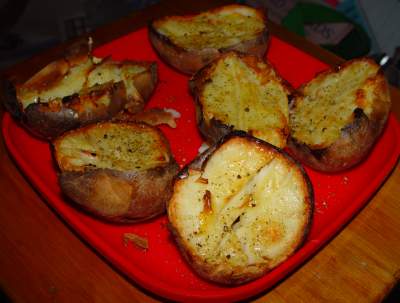
Take some potatoes, put them in the oven on a steel tray at about 300°C. Wait some time, decide that they’re not cooking fast enough. Pull them out of the oven, cut ’em in half, return to oven. Sit down to watch an enthralling historical fiction video. Completely lose track of the time. Panic when the house starts to smell like a chip shop. Remove from oven. Wait for “pink” cooling noises to die down. Paint with butter or marge, sprinkle with Tinderbox Herbal Sprinkle (tasty lawn clippings from Balingup), eat with gusto.
They’re like big, thick, chunky chips but with much less fat.
Comments